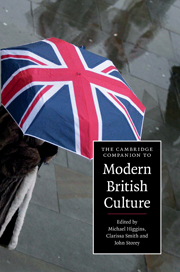Book contents
- Frontmatter
- Introduction: modern British culture
- 1 Becoming British
- 2 Language developments in British English
- 3 Schooling and culture
- 4 The changing character of political communications
- 5 Contemporary Britain and its regions
- 6 Contemporary British cinema
- 7 Contemporary British fiction
- 8 Contemporary British poetry
- 9 Theatre in modern British culture
- 10 Contemporary British television
- 11 British art in the twenty-first century
- 12 British fashion
- 13 Sport in contemporary Britain
- 14 British sexual cultures
- 15 British popular music, popular culture and exclusivity
- 16 British newspapers today
- 17 The struggle for ethno-religious equality in Britain: the place of the Muslim community
- Guide to further reading
- Index
7 - Contemporary British fiction
Published online by Cambridge University Press: 28 September 2010
- Frontmatter
- Introduction: modern British culture
- 1 Becoming British
- 2 Language developments in British English
- 3 Schooling and culture
- 4 The changing character of political communications
- 5 Contemporary Britain and its regions
- 6 Contemporary British cinema
- 7 Contemporary British fiction
- 8 Contemporary British poetry
- 9 Theatre in modern British culture
- 10 Contemporary British television
- 11 British art in the twenty-first century
- 12 British fashion
- 13 Sport in contemporary Britain
- 14 British sexual cultures
- 15 British popular music, popular culture and exclusivity
- 16 British newspapers today
- 17 The struggle for ethno-religious equality in Britain: the place of the Muslim community
- Guide to further reading
- Index
Summary
Introduction
At the end of the twentieth century it has for the first time become possible to see what a world may be like in which the past, including the past in the present, has lost its role, in which the old maps and charts which guided human beings singly and collectively through life, no longer represent the landscape through which we move, the sea on which we sail. In which we do not know where the journey is taking us.
Ours is not the first age to think of the 'contemporary' in terms of a loss of the representative power of existing historical maps, but the metaphor has become almost tiresomely familiar to us. Recognising that the map has now come to function primarily as a placeholder term for all those complex and mysterious cognitive frameworks through which we orient ourselves in space and time, Fredric Jameson suggests that maps 'enable a situational representation on the part of the individual subject to that vaster and properly unrepresentable totality which is the ensemble of society's structures as a whole'. Jameson's idea of 'cognitive mapping' is a useful way of beginning to think about the contemporary 'space' of fiction and evolutions in fictional forms which provide peculiarly appropriate vehicles for the articulation of the complex 'structure of feeling' of our own historical moment.
- Type
- Chapter
- Information
- The Cambridge Companion to Modern British Culture , pp. 115 - 136Publisher: Cambridge University PressPrint publication year: 2010



